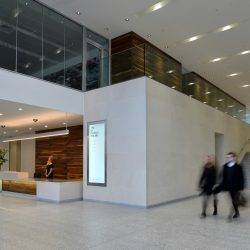November 15, 2016
Increased take-up of office space in Manchester as Brexit influences investors 0
 Take-up of prime office space in central Manchester is on course to hit 1 million sq ft in 2016 and could be influenced by the impact of Brexit. The latest research by Colliers International suggests that overseas investors retained an interest in prime Manchester office space partly because of the devaluation of sterling following the Referendum vote for the UK to leave the EU – as proven by the recent £164m acquisition of the 288,000 sq ft One St Peter’s Square by global real estate investor Deka Immobilien. There have been a series of other major deals, including an insurance firm taking 165,000 sq ft of Grade A office scheme, a global law firm moving its global centre into an 80,848 sq ft development; and a government department negotiating a 60,000 sq ft deal. The legal sector accounted for almost 25 percent of total office take-up so far in 2016, followed by media and technology (16 percent) and business services (15 percent). However, all this activity may result in a lack of ready to occupy space in the city by early 2017.
Take-up of prime office space in central Manchester is on course to hit 1 million sq ft in 2016 and could be influenced by the impact of Brexit. The latest research by Colliers International suggests that overseas investors retained an interest in prime Manchester office space partly because of the devaluation of sterling following the Referendum vote for the UK to leave the EU – as proven by the recent £164m acquisition of the 288,000 sq ft One St Peter’s Square by global real estate investor Deka Immobilien. There have been a series of other major deals, including an insurance firm taking 165,000 sq ft of Grade A office scheme, a global law firm moving its global centre into an 80,848 sq ft development; and a government department negotiating a 60,000 sq ft deal. The legal sector accounted for almost 25 percent of total office take-up so far in 2016, followed by media and technology (16 percent) and business services (15 percent). However, all this activity may result in a lack of ready to occupy space in the city by early 2017.















 The UK labour market will continue to expand at a strong rate in 2015 but there are unresolved issues relating to levels of pay and how best to increase workplace productivity to drive further growth, according to Mark Beatson, chief economist for the Chartered Institute of Personnel and Development (CIPD) in
The UK labour market will continue to expand at a strong rate in 2015 but there are unresolved issues relating to levels of pay and how best to increase workplace productivity to drive further growth, according to Mark Beatson, chief economist for the Chartered Institute of Personnel and Development (CIPD) in 










December 8, 2015
Six human resources costs you might avoid by choosing the right office 0
by Darren Bilsborough • Comment, Property, Workplace, Workplace design
(more…)